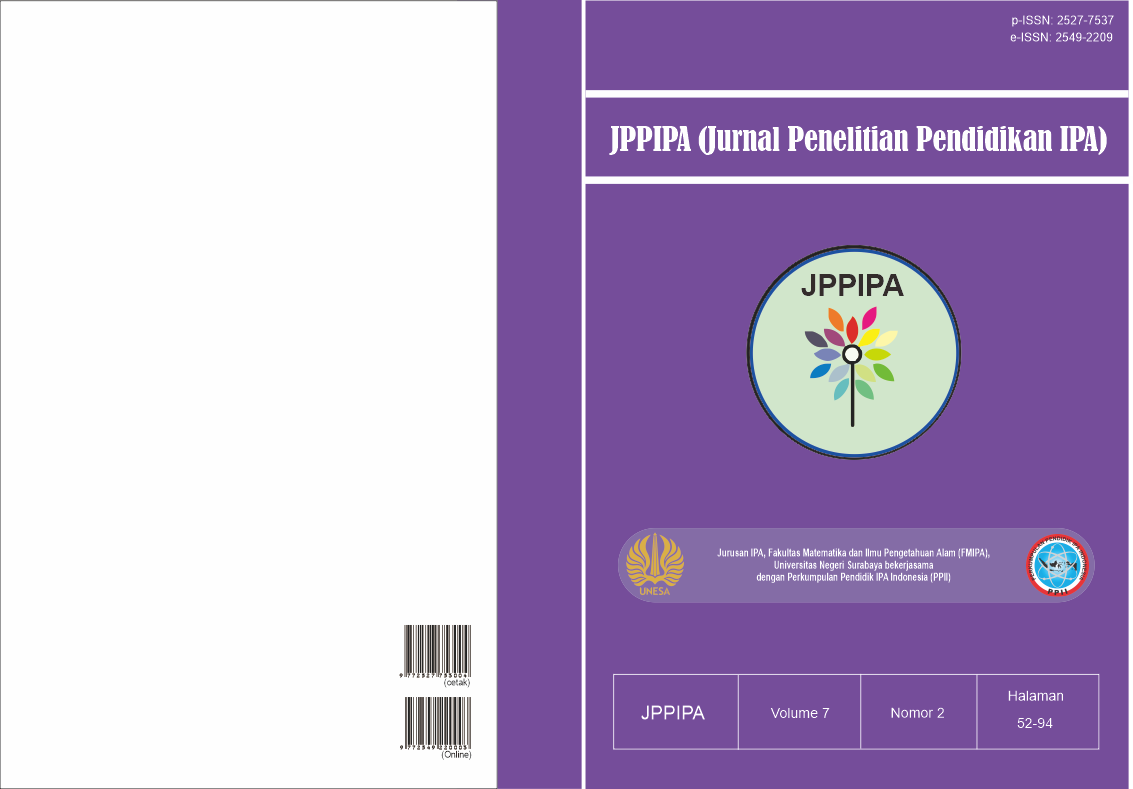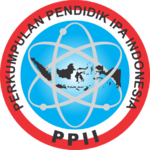DEVELOPMENT OF SCIENCE MODULE BASED ON INQUIRY SCIENCE ISSUES TO IMPROVE STUDENTS' CRITICAL THINKING SKILLS
DOI:
https://doi.org/10.26740/jppipa.v7n2.p88-94Keywords:
Science, module, inquiry science issues, critical thinkingAbstract
This study aims to 1) know how to develop modules, 2) know the feasibility of the module, and 3) know the effectiveness of the IPA module with an approach of Inquiry Science Issues on Climate Change Materials to improve the critical thinking skills of students in grade VII junior high school. The development model used in this study is ADDIE (Analysis, Design, Development, Implementation, and Evaluation). Data collection techniques using observation methods, interviews, as well as documentation. Quantitative analysis techniques for analyzing data have been validated by experts and module assessments by practitioners and students. In contrast, the analysis of qualitative descriptive data to analyze the resulting module data. The results of the study concluded that 1) Modules developed based on the ADDIE model (Analysis, Design, Development, Implementation, and Evaluation) with inquiry science issues that use critical thinking indicators. 2) Module eligibility in terms of validation results Material Expert Module got the same result of 90.27% with categories Excellent, media expert validation of 89.06% and 88.43% respectively with excellent category, practitioner ratings of 88.33% and 87.91% respectively with excellent categories, student ratings of 81.05% with very categories good. 3) The effectiveness of the module analyzed using the N-gain test obtained a result of 0.5014; 0.3 g ? ? 0.7, so the module is said to be effective with a moderate category.
References
Adi, B., & Rinanto, Y. (2017). MATERI JAMUR UNTUK MENINGKATKAN KEMAMPUAN BERPIKIR KRITIS SISWA KELAS X SMA NEGERI 1 CEPOGO BOYOLALI. 6(1).
Ahmadi, Iif Khoiru., dkk. Strategi Pembelajaran Berorientasi KTSP. Jakarta: Prestasi Pustaka, Cetakan. I, 2011.
Budiono, E., & Susanto, H. (2006). Penyusunan Dan Penggunaan Modul Pembelajaran Berdasar Kurikulum Berbasis Kompetensi Sub Pokok Bahasan Analisa Kuantitatif Untuk Soal-Soal Dinamika Sederhana Pada Kelas X Semester I SMA. Jurnal Pendidikan Fisika Indonesia, 4(2).
Duron, R., B. Limbach, dan W. Waugh. 2005. Critichal thinking framework for any discipline. International Journal of Teaching and Learning in Higher Education. 17(2): 160-166
Daryanto. 2013. Menyusun Modul Bahan Ajar Untuk Persiapan Guru Dalam Mengajar. Yogyakarta: Gava Media.
Ennis, R. H. 2011. The Nature of Critical Thinking: An Outline of Critical Thinking Dispositions and Abilities. University of Illinions.
Fachrurrazi. 2011. Penerapan Pembelajaran Berbasis Masalah Untuk Meningkatkan Kemampuan Berpikir Kritis Siswa Dan Komunikasi Matematis Siswa Sekolah Dasar. Jurnal Penelitian Pendidikan. 11(1): 76-89
Fatimah, F., Nurohman, S., & Setianingsih, W. (2017). Pengembangan Bahan Ajar Lembar Kegiatan Peserta Didik (LKPD) Berbasis Inquiry Science Issues Untuk Mengembangkan Critical Thinking Skills Dan Curiosity Peserta Didik SMP Development of Teaching Material Student Worksheet Based Inquiry Science Issues to Develop Critical Thinking Skills and Curiosity Junior High School Student. Pend. Ilmu Pengetahuan Alam-S1, 6(5), 302-307.
Friedrichsen, Patricia J., et. al. (2016). Design of a Socio-Scientific Issue Curriculum Unit: Antibiotic Resistance, Natural Selection, and Modleing. International Journal of Design for Learning. Vol. 7, Issue 1
Facione, P. a. (2011). Critical Thinking: What It Is and Why It Counts. In Insight assessment (Issue ISBN 13: 978-1-891557-07-1.). https://www.insightassessment.com/CT-Resources/Teaching-For-and-About-Critical-Thinking/Critical-Thinking-What-It-Is-and-Why-It-Counts/Critical-Thinking-What-It-Is-and-Why-It-Counts-PDF.
Kartika, A. D., Zubaidah, S., & Kuswantoro, H. (2020). Pengembangan Modul Biologi Berbasis Problem Based Learning Siswa SMK Pertanian pada Materi Pewarisan Sifat. Jurnal Pendidikan: Teori, Penelitian, Dan Pengembangan, 5(6), 860. https://doi.org/10.17977/jptpp.v5i6.13673.
Mahadiraja, D., & Syamsuarnis, S. (2020). Pengembangan Modul Pembelajaran Berbasis Daring pada Mata Pelajaran Instalasi Penerangan Listrik Kelas XI Teknik Instalasi Tenaga Listrik TP 2019/2020 di SMK Negeri 1 Pariaman. JTEV (Jurnal Teknik Elektro dan Vokasional), 6(1), 77-82.
Uddin, S. (2022). Causes, Effects, and Solutions to Global Warming. Academia Letters, February. https://doi.org/10.20935/al4829
Downloads
Published
How to Cite
Issue
Section
 Abstract views: 377
,
Abstract views: 377
, PDF Downloads: 388
PDF Downloads: 388












